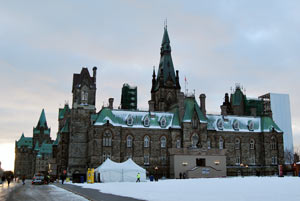
Welcome to my new series, the “Canadian List of Ten”! Ten weeks, ten posts, ten lists and one hundred new Canadian things to discover, from foods to languages, from cities to the weather.
Canadian politics take some time to get used, especially for Europeans. The three levels of government are new to us—there are no provinces nor states in Europe—and national politics matters are somewhat eclipsed by local news, more relevant to communities in this huge country.
Canada is a parliamentary democracy
The Parliament has three constituent parts—the House of Commons, the Senate and the Sovereign, or the Sovereign’s representative. Provincial legislatures include the Lieutenant Governor and the elected Assembly.
There are three levels of government
These three levels are the federal government (national level), the provincial or territorial government (provincial or territorial level) and the municipal government (city level).
The federal government is responsible for defence, foreign policy and foreign relations, the postal service, criminal law, immigration and citizenship.
The provinces and territories are responsible for education and municipal institutions. They also share responsibilities with the federal government for matters such as health and transportation.
The municipal government deals with police and fire protection, water and sewer services, recreation and local public transportation.
The are four main federal political parties
These four parties are the Conservative Party of Canada, the Liberal Party of Canada, the New Democratic Party and the Bloc Québécois.
There are another 15 parties or so of lesser importance recognized by Election Canada. For instance, the Communist Party of Canada, the Marijuana Party of Canada and the Work Less Party.
The federal government has three branches
These three branches are the executive, the legislative, and the judicial branch.
The executive branch, represented by the Governor General, is the decision-making branch.
The legislative branch is made up of the Governor General, the House of Commons, and the Senate and it creates laws.
The judicial branch administers justice.
There are elections for several levels of government
Canada holds elections for several levels of government—nationally, provincially and territorially, and municipally.
To vote, you must be a Canadian citizen aged 18 and older and be on the voters’ list. Elections Canada, which ensures that Canadians can exercise their democratic rights to vote and be a candidate, is an independent, non-partisan agency that reports directly to Parliament.
Elections campaigns in Canada are definitely shorter than in France
The minimum length of a campaign is 36 days and the longest campaign lasted 74 days (back in 1926!).
Canadians do not vote directly for a Prime Minister.
They vote for their local Member of Parliament (MP), who sits in the House of Commons. These MPs are members of a federal political party. Generally, the leader of the party with the most seats in the House of Commons becomes the Prime Minister.
Historically, the Prime Minister could ask the Governor General to call an election at any time
However, one had to be called no later than five years after the last election. In 2007 the Parliament passed an act fixing federal election dates every four years, unless the government loses the confidence of the House of Commons.
We recently had an epidemic of elections, with national elections held in 2004, 2006 and 2008. We avoided an election in 2009, though.
Taking holidays when you are in politics is easy
For instance, Prime Minister Stephen Harper just shut down the Parliament until March. The Conservative Party holds the record for shutting down Parliament—148 days over just four years in office.
Canada has had a number of political scandals
In 2004, the sponsorship scandal involved the misuse and misdirection of funds disbursed through the Liberal government’s 1990s sponsorship program. In 2008 there was the Julie Couillard scandal—Conservative Foreign Minister Maxime Bernier resigned after leaving sensitive NATO documents in the home of Julie Couillard, an ex-girlfriend with links to the Hells Angels biker gang!
Share this article!



i don’t know which is better. parliament away on holiday, or parliament in session. i suspect more gets done when it is on holiday.
at least, that’s true in the united states. (our parliament is called congress).
in the u.s. we never have scandals. well, besides the sexual and financial ones.
.-= Seraphine´s last blog ..Sugarcoating =-.
Interesting post. I never knew there’s such a thing as a Marijuana Party.
.-= Linguist-in-Waiting´s last blog ..What is the Color of Your Bra? =-.
Nothing new for me. We get all this multiplied by a big number every day. Similar system in India too.
.-= Nigel Babu´s last blog ..Backing up with APTonCD =-.
california is having a referendum ballot later this year.
one of the items to vote on is having the state legislature meet fewer days per session.
.-= Seraphine´s last blog ..Sugarcoating =-.
Hi Zhu,
I heard about that Parliment shut down by PM Harper. On what basis did he decide this ?? That is a long break !!
I watch Radio Canada’s “shortened” evening news en Français, on TV5 , every morning in Paris. I like keeping up with what’s happening over in your country 😉
Bises 🙂
Tell Harper to go back to work! :p He wasn’t elected to take long vacation whenever it’s convenient to him!
Gj :3 ONLY THE PROBLEM IS THAT THE PRIME MINISTER IS JUSTIN TRUDEAU.. Well it is now
Sorry for the caps 🙁
Why, exactly? I voted for him, so I’m probably not going to agree with you but I don’ mind a debate 😀
@Seraphine – Not too many sexual scandals actually in Canada come to think of it… During the Clinton scandals, French were just like “what’s the big deal?” 😆
@Linguist-in-Waiting – Canada is supposed to be a pot country. I must be really naive cause I don’t see it though.
@Nigel Babu – I love the way you put it! Yes, much bigger numbers in India, for sure. What’s the population size? Did you inherit the system from the British?
@Seraphine – Lazy bastards…
@barbara – The official reason is that he wants to wait till the Olympics are over. The real reason IMO is that he doesn’t want the inquiries about the Afghan detainees torture case to progress. The Conservators are still strong but in a bit of trouble right now.
@Bluefish – I know, so unfair!
Some of them are pretty standard across the Commonwealth Nations.
We have similar stuff in Malaysia too.
Did you know that all other Commonwealth Nationals can also vote in the UK?!
This is a bit special because I don’t think British people can vote in Malaysia.
.-= London Caller´s last blog ..My neck hurts! / 我的颈好痛! / Leherku sakit! / 首が痛い! =-.
Well, we did inherit the parliamentary system from the British, but with 1.17 billion people, I doubt if its effective enough. But as a friend of mine put it, “Democracy is not a good form of governing, but compared to the alternatives, its the best we have.”
.-= Nigel Babu´s last blog ..Backing up with APTonCD =-.